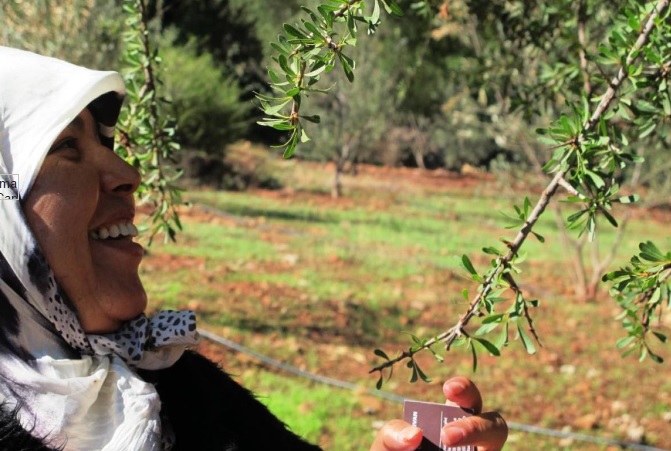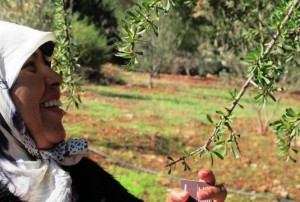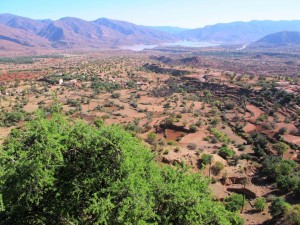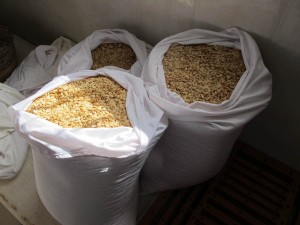Thomson Reuters Foundation
by Laurie Goering | @lauriegoering
In these arid and stony red-earth hills in southwest Morocco, flanked by the Sahara Desert and the snowy high Atlas Mountains, finding a way to make money isn’t easy. Water is scarce, rainfall increasingly unpredictable, and not much but goats survive on the sparse vegetation.
But the 150 members of the Afoulki women’s cooperative are pounding away at the problem – literally.
In a back room at the hillside cooperative’s centre in Ait Hssaine, a dozen scarf-clad Berber women rhythmically bring stone hammers down on argan nuts, expertly splitting the shells and then flicking the oil-bearing kernels into a woven basket.
The rich argan oil, once pressed and refined, is both tasty and popular on international markets as an additive to cosmetics, soaps, shampoos and other products. Virtually all the world’s supply comes from this area of Morocco, inland from the coastal city of Agadir.
“There’s nothing else like argan here. It’s the main thing,” said Rquia Elhjam, one of the women pounding nuts to produce the oil. She and other women call it their “wallet” – the source of much or all of their income.
But half of the 2.5 million-square kilometre argan forest in the region has been lost over the last century, cut for firewood or charcoal making, eaten by goats or removed to make way for expanding families, said Moha Haddouch, a former agriculture ministry official now working with the U.N. Development Programme (UNDP).
Fewer trees means less reliable rainfall in the area and fewer opportunities for women and their families. So in an effort to protect the remaining forest, plant more trees and boost incomes, UNDP and community members are working to put in place a “payment for ecosystem services” scheme.
CASH FOR NATURE
Under the plan, foreign tourists who flock to Agadir’s sandy beaches and travel into the UNESCO-recognised argan reserve to buy oil and local honey, eat Berber food and enjoy the spectacular scenery will be asked to offset the carbon emissions generated by their travel with a donation. Tourism businesses may also contribute.
Around $10 per visitor – about the cost of offsetting round-trip air travel from Europe, UNDP officials said – could pay for argan tree seedlings and water to irrigate them, or support traditional beekeeping in the hills and the pollination services the bees provide.
The aim is to ensure that the people who work to protect nature get some pay-off from their labour, and that those who benefit from the services nature provides – including a landscape attractive to tourists – contribute to the cost of maintaining them.
“If it weren’t for the local population, the forest would be long gone,” said Fatima Ait Moussa, president of the women’s argan cooperative.
Cash coming into the community from tourism payments would give added incentives to protect trees – and top up the relatively low prices women get for their oil, which sells locally for $25 a litre, compared to $200 a litre in Paris, Haddouch said.
Hicham Kdir, president of the local tourism association, said business owners are beginning to understand that if they don’t help protect the environment and the communities their clients come to see, they stand to lose out.
His association, and the beach guest house he runs with his Australian-born wife Renee O’Sullivan, started a campaign earlier this year to clean up their sometimes trash-strewn Tamraght beach.
After successful volunteer clean-up days on the beach and in the neighbouring scenic “Paradise Valley”, 20 local tourism businesses last month donated cash to pay two full-time beach trash collectors and install waste bins.
The success of the campaign “Keep it Clean, Keep it Zouine” – which means “beautiful” in the local Darija Arabic dialect – suggests that “when businesses see the results and the value, they are excited to do more”, Kdir said.
“We understand we need to help protect” the region, he said. “I think people are going to pay.”
CREATING AMBASSADORS
To help everyone understand the sometimes complex effort, UNDP has also taken locals, tourism leaders and government officials to Costa Rica to see working “payment for ecosystem services” programmes there that tap tourist dollars for biodiversity protection and community support.
“Now all these people are really strong advocates for the project – they are like ambassadors,” said Mohamed Fouad Bergigui, a programme analyst with UNDP Morocco.
Currently UNDP, channeling money from the Global Environment Facility, is funding the start-up of the Moroccan project. It is equipping the women’s argan cooperative with processing machines to boost the quantity and quality of their oil, working with local beekeepers, and providing argan seedlings and water deliveries to farmers in the area.
Just as important, UNDP is calculating what level of income from tourism would be needed to keep the project going privately – and helping conduct the negotiations to get a deal in place, probably in 2017, Bergigui said.
Plenty of questions remain. Those include whether tourists will stump up cash, whether that cash will actually make its way to communities, whether it will be sufficient to keep local people interested, and whether the level of “ecosystem services” they provide can be measured in a meaningful way.
“On some fronts we will fail, that’s for sure,” Bergigui said.
But the effort is likely to have benefits beyond those aimed directly at the participants. Hit by failing rainfall and drying reservoirs, the regional government, for instance, is building a desalination plant to produce irrigation water for farmers.
Enlarging the argan forest to protect rainfall, a form of “soft” adaptation to changing climate conditions, can be much less costly and more sustainable, Bergigui said.
Improving opportunities to earn money in poor rural areas may also be able to stem the growing and unsustainable flood of migration to Morocco’s cities by young people looking for a better life, he said.
“These payment-for-ecosystem-services schemes can revolutionise the way of doing business in the countryside,” he said. “Everyone is a winner here, including nature.”
Elhjam, deftly pounding her argan nuts for $5 a day, agreed. “Even without more money, we need to protect the environment,” she said. “If we get more money too, that’s good.”
(Reporting by Laurie Goering; editing by Megan Rowling; Please credit the Thomson Reuters Foundation, the charitable arm of Thomson Reuters, that covers humanitarian news, climate change, women’s rights, trafficking and property rights. Visit http://news.trust.org/climate)











